The definitive guide to VPNs: From protecting information to buying cheap tickets
Virtual private networks serve to establish encrypted communications, but it is essential to use one that really guarantees the privacy of information

When you hear about VPNs (virtual private networks), you likely think of a hacker in a hoodie sitting in an unlit room and accessing the dark web on their computer. However, these tools are also useful for ordinary internet users because they guarantee private connections between our devices and web pages and other services.
Prior to using a VPN, it is important to bear in mind that privacy is not synonymous with security. As Josep Albors, the director of research and outreach at the ESET computer security company in Spain, explains to this newspaper, “VPNs do not prevent you from accessing a web page, downloading a virus and installing it on your device, because that is not their purpose,” even though they are often sold as security systems.
“A VPN creates a tunnel in which encrypted communication is made between your connection on your device and a web page or a service you want to access, and you don’t want anyone to be able to see the data that is being transmitted through this private tunnel,” he observes. In addition to offering privacy, VPNs have other functions, such as allowing the user to watch a movie that is not available in their country and helping them find cheaper prices on certain products.
Privately connect to Wi-Fi networks when traveling
Over the past few years, there’s been increased awareness of the dangers of connecting to a public Wi-Fi network. We now know that, while it is tempting to use free Wi-Fi outside, in a shopping mall or even on the beach, there may be a cybercriminal lurking on the other side, ready to steal our information. Having a VPN ensures that when we connect to a public Wi-Fi network, the communications are private, although we must still take precautions when accessing web pages and downloading applications or files. “It prevents someone who is spying on that Wi-Fi from knowing [the websites] we’re accessing and the information that we are sharing,” explains Albors.
Buy cheaper airline tickets and more affordable subscriptions
As Josep Albors reminds us, some people use VPNs to obtain lower prices when buying airline tickets. “Depending on the country from which you buy them, the price may vary by a certain amount, depending on the purchasing power of the people living in that country. If you buy a plane ticket from the Philippines, it is likely that a VPN will save you some money,” he explains.
However, in an article published in USA Today, journalist Nathan Diller says that he has found that, when buying airline tickets, the difference in price between the United States and Mexico is not usually significant. In fact, when using a VPN with a server in the United Kingdom, a hotel reservation was more expensive than from the US. Even so, it depends on the specific case, and some users claim to find lower prices by changing their location to countries with less purchasing power.
In regard to price discrimination based on a device’s IP address, if one changes the location with a VPN and deletes the cookies and cache, one can get better prices for online purchases generally. Some people use VPNs to buy video games or subscribe to music platforms at cheaper prices in countries halfway around the world.
Keep one’s identity hidden in countries with authoritarian governments
VPNs are not only useful for entertainment or consumption; in countries where certain websites cannot be accessed, where there is censorship and users who share or search for certain content are in danger of being imprisoned, such networks can be important for helping users to protect their identity and information.
However, not all VPNs shield user information in the same way. Albors explains that free versions tend to store some information: “They prevent [others] from spying on [which websites] you are visiting and your communications, but these VPNs can store information on their servers to sell [people] other products. And that’s a problem because, if down the road someone in a country with oppressive legislation requires that information, it can expose people who are trying to access content that is otherwise inaccessible and considered illegal in their country to punishment.”
Keeping information hidden may be essential for activists, human rights defenders and the LGTBI community. “These people would be at risk if they used a VPN that could give away their information when that country’s authorities request it. That’s why it is important to only [use VPNs] that offer guarantees, have been audited (companies will advertise that they’ve been audited), do not keep any kind of log and if they try to tap into their clients’ information, they cannot provide any. That’s essential, and free VPNs do not usually offer that,” adds the expert.
Telework
Albors emphasizes that it is advisable for all companies to use VPNs because “when you use remote access to a company computer, or one of its online platforms, to handle confidential information, it makes sense for you to only be able to access it from the company’s internal network or from a tunnel that you generate from …wherever you are working, and for this communication to be encrypted so that no one can spy or steal credentials. That way, even if someone does have the credentials, they cannot access the platform because they are not connecting through the company’s VPN.”
Sign up for our weekly newsletter to get more English-language news coverage from EL PAÍS USA Edition
Tu suscripción se está usando en otro dispositivo
¿Quieres añadir otro usuario a tu suscripción?
Si continúas leyendo en este dispositivo, no se podrá leer en el otro.
FlechaTu suscripción se está usando en otro dispositivo y solo puedes acceder a EL PAÍS desde un dispositivo a la vez.
Si quieres compartir tu cuenta, cambia tu suscripción a la modalidad Premium, así podrás añadir otro usuario. Cada uno accederá con su propia cuenta de email, lo que os permitirá personalizar vuestra experiencia en EL PAÍS.
¿Tienes una suscripción de empresa? Accede aquí para contratar más cuentas.
En el caso de no saber quién está usando tu cuenta, te recomendamos cambiar tu contraseña aquí.
Si decides continuar compartiendo tu cuenta, este mensaje se mostrará en tu dispositivo y en el de la otra persona que está usando tu cuenta de forma indefinida, afectando a tu experiencia de lectura. Puedes consultar aquí los términos y condiciones de la suscripción digital.









































